#joe gayton
Explore tagged Tumblr posts
Text

#hell on wheels#tv shows#amc#joe gayton#tony gayton#anson mount#colm meaney#robin mcleavy#illustration#vintage art#alternative movie posters
6 notes
·
View notes
Text
I found this on NewsBreak: Joe Gayton, ‘Hell on Wheels’ Cocreator and ‘Faster’ Screenwriter, Dies at 66
I found this on NewsBreak: Joe Gayton, ‘Hell on Wheels’ Cocreator and ‘Faster’ Screenwriter, Dies at 66
0 notes
Text
0 notes
Photo

Mind Ripper | 1995
#Joe Gayton#Wes Craven#Mind Ripper#Dan Blom#stressed out#monster movie#90s horror#Hammersmith Horror
51 notes
·
View notes
Photo










Bulletproof
#Bulletproof#Adam Sandler#Damon Wayans#I Will Always Love You#Ernest R. Dickerson#Ernest Dickerson#Joe Gayton#Lewis Colick
14 notes
·
View notes
Text









Mind Ripper (The Outpost, 1995)
"Loose ends come back to haunt you."
#mind ripper#wes craven#the outpost#the hills have eyes 3#horror film#american cinema#creepy face#films i done watched#1995#lance henriksen#claire stansfield#john diehl#natasha wagner#gregory sporleder#giovanni ribisi#dan blom#adam solomon#john apicella#joe gayton#originally conceived as a second sequel to the hills have eyes this is sometimes found with that title. the connection was dropped in pre#production tho. tbh lance henriksen was the only reason i gave this a go. it's only other claim to fame is as the first film of ribisi#i tried to go in with an open mind (heh) but i pretty much expected this to be either absolutely dire or surprisingly entertaining#almost disappointingly it's neither. it's just very run of the mill. nothing about it is original it's all been done a hundred times before#the first half is very weak and the script is painful. it picks up in the second half when henriksen comes into it more. but it never reall#impresses and it isn't so bad it's good. just very very average. it's a shame too because some good ideas very almost appear only to be#dismissed (the question of ethics in reviving the dead is complicated in the second half by the revelation that the dead person in question#had attempted suicide but this is forgotten almost as soon as it's revealed). henriksen is the best thing in it of course but there's only#so much he can do with the material. ribisi is textbook asshole young adult until he gets a minute amount of character development in the#last act. nobody else really registers although i must say solomons idiot jock character becomes surprisingly likable as the film goes on#the most horrific moment isn't any of the monster mutilation but when a character pointlessly loses a toenail by stubbing their foot
8 notes
·
View notes
Photo

Tappajamutantti / Mind Ripper (1995) Finnkino https://www.videospace.fi/release/tappajamutantti_vhs_finnkino_finland
#Videospace#VHS#Tappajamutantti#Mind Ripper#Joe Gayton#Lance Henriksen#Claire Stansfield#John Diehl#VHS tapes#VHS art#VHS cover
2 notes
·
View notes
Text

Mind Ripper (1995) dir. Joe Gayton
0 notes
Photo









41 notes
·
View notes
Photo
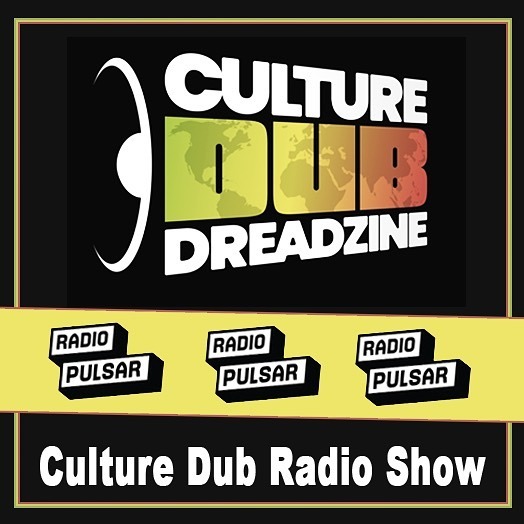
TONIGHT 🔥🔥🔥 CULTURE DUB RADIO SHOW PLAYLIST #780 #playlist 📻 Tune in Tuesday, October 25th 2022 inna Culture Dub Radio Show on Radio Pulsar from 9pm to 11pm (GMT+1) to listen lot of fresh tunes roots, reggae, digital, dub, steppa, electroDub, A jamaican story with Harlem Shuffle Records, the new release of Culture Dub Records with DrObi & Anja G, exclusives tunes from the new LP "Lava" of O.B.F Sound System and win your cd "Fire Drop" of ASHKABAD, hosted by AlexDub : 📻 📻 The Gaytones, Naomi, The Inspirations, JJ Allstars, The Dirty Makers, Dub Shepherds, Pinnacle Sound, Irie Ites, Roots Radics, Stinging Ray, The 18th Parallel, Fruits Records, Cornell Campbell, TriXstar, YOHA and the Dragon Tribe, Metta Frequencies, Kheman, Mighty Patch, Vale, zion.head, Abstracker, Daman, Joe Yorke, Martin Melody, Zentone, High Tone, ZENZILE, Jolly Joseph, Radit echoman, Higher Meditation, Michael Rose, Ashanti Selah, Yaksha, Dan I Locks, Dr.Obi, Anja G, Ashkabad, Forelock, O.B.F Soundsystem, Sr. Wilson, Belén Natalí, Nazamba, High Pressure Sound System, Junior Dread, Massive Dub Corporation, Charlie P, Infiammati Dub, Lion Warriah, FULL DUB, Alix Pilot, Ghislaine Melih ! 🔊 Playlist : https://culturedub.com/blog/culture-dub-show-780-25-octobre-2022-radio-pulsar/ 📻 Win your CD "Fire Drop" of Ashkabad ! Large Up, Alex Dub 📻 www.radio-pulsar.org // 95.9 FM (Poitiers) #radio #radioshow #culturedubshow #culturedubradioshow #fm #webradio #radiopulsar #alexdub #playlist #selection #exclusive #fresh #dubplate #news #roots #rocksteady #reggae #dub #steppa #stepper #electro #lava #win #culturedubrecords @radio.pulsar.95.9 @culturedub @obfsoundsystem @ashkabad_off @drobidubwise @anjagdub @harlemshufflerecords @fruits_records @ruffaroots @iwelcompromo @flowercoastprod @odgprod @bat_records @trixstarmusic @yoha_officiel @irie_ites_official @hightoneofficial @zenzilemusic @jarringeffects @damandub @massivedubcorporation @charliepreggae @lionwarriah @infiammati_dub @mettafrequencies @radit.echoman @higher_meditati0n @dubjunction @yakshasounds @ashantiselahdub @dan_i_locks @zionheadofficial @joeyorkemusic @dubshepherds @jollyjosephshepherds @pinnaclesound (à Radio Pulsar) https://www.instagram.com/p/CkIN6XQMdNv/?igshid=NGJjMDIxMWI=
#780#playlist#radio#radioshow#culturedubshow#culturedubradioshow#fm#webradio#radiopulsar#alexdub#selection#exclusive#fresh#dubplate#news#roots#rocksteady#reggae#dub#steppa#stepper#electro#lava#win#culturedubrecords
3 notes
·
View notes
Video
youtube
Robert Altman's Jazz '34: Remembrances of Kansas City Swing Kansas City Band "Moten Swing" Credits:Joshua Redman as Lester Young - tenor sax Craig Handy as Coleman Hawkins - tenor sax James Carter as Ben Webster - tenor sax Dadid Murray - tenor sax Jesse Davis - alto sax David "Fathead" Newman Jr. - alto sax Don Byron - clarinet/baritone sax Olu Dara - cornet Nicholas Payton - trumpet James Zollar - trumpet Curtis Fowlkes - trombone Clark Gayton - trombone Victor Lewis as Joe Jones - drums Geri Allen as Mary Lou Williams - piano Cyrus Chestnut as Count Basie - piano Ron Carter - bass Christian McBride - bass Tyron Clarke - bass Russell Malone - guitar Mark Whitefield - guitar Kevin Mahogany - vocal
6 notes
·
View notes
Audio
01 - Gotta New Girl - Bobby Day 02 - Whenever You're Ready - Bob Luman 03 - Squeeze Me - Joe Boots 04 - Ain't Nobody Here but Us Chickens - Asleep At The Wheel 05 - Chicken Shack - Leroy Van Dyke 06 - Drivin' Wheel - Robert Gordon 07 - Bigelow 6-200 - Brenda Lee 08 - Come What May - Elvis Presley 09 - This Is Love - The Gaytones 10 - Vip-A-Dip - The Mint Juleps 11 - I'll Do It - Shirley & Lee 12 - Keep Those Wonderin' Eyes Off My Baby - Gil Bernard 13 - Ma Ma Marie - The Gaylords 14 - No Mama No Papa - Patti Jerome 15 - Be Mine - Louis Prima With Sam Butera & The Witnesses 16 - Bim Bam - Sam Butera 17 - Pretty Wild - The Chords 18 - Rock All Night - Shirley & Lee 19 - Go Go Go - The Treniers 20 - I Wanna New Girl - Ben Hewitt 21 - The Cat - Cappy Bianco 22 - When I Found You - Jerry Reed 23 - Believe It or Not - Donnie Elbert 24 - Shake It Up - Sandy Scott 25 - Rock Everybody - The Teen Queens 26 - Monkey's Uncle - Ray Sharpe 27 - Drinkin' Wine Spo-Dee-O-Dee - Larry Dale 28 - Don't Stop Lovin' Me - Eugene Church 29 - Dynamite Darling - Otis Williams & The Charms 30 - Bumble - Phil Baughn 31 - Windy City Boogie Rock - J.T. Brown 32 - Sunday Baby - The Delta Rhythm Boys 33 - Rock a Beatin' Boogie - The Deep River Boys 34 - 16 Teens - The Rover Boys 35 - As Long As I'm Movin' - Ruth Brown 36 - Do Lord - Jackie Wilson & Linda Hopkins
15 notes
·
View notes
Photo
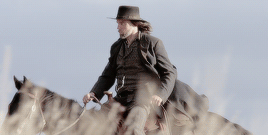
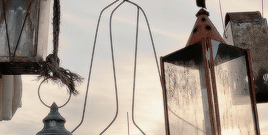

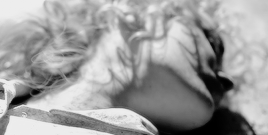

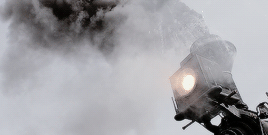
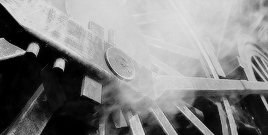


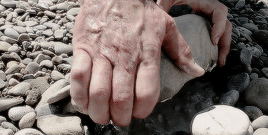
‘ The world don't care about our plans. ‘
Hell on Wheels (2011 - 2016) created by Joe & Tony Gayton
179 notes
·
View notes
Text
Jazz and The Gothic
I haven’t seen much discussion about the place of jazz music in the gothic genre but as I mentioned briefly in my post about creepy cartoons, jazz songs of the early to mid 20th century often featured dark subject matter and imagery in their lyrics, extremely reminiscent of other gothic media. Additionally, a lot of this music heavily influenced later gothic media, like the cartoons they were featured in, as well as many more current works like compositions by Danny Elfman and the miniseries, Over the Garden Wall. It also performed a similar function of classic gothic literature, examining various social or moral issues in complex ways and focusing on uneasiness and uncanniness to explore structures within society.
Of course the first name that comes to mind when discussing gothic jazz is Cab Calloway, one of the most prominent jazz artists of the 20th century. His distinct wailing voice and his unpredictable movements in his dancing not only exemplified the improvisational and creative qualities of jazz music, but also created eerie moods in his darker songs. The lyrics of these songs also tell tragic stories and imply horrific images. Arguably his most popular song, “Minnie the Moocher” which was accompanied by surreal, disturbing animation in the Betty Boop cartoon of the same name, alludes to prevalent drug problems during the Great Depression of the 1930s. It tells the story of Minnie, who gets into the world of cocaine and opium thanks to her boyfriend (who is most likely a bootlegger or drug-related criminal). Despite the mention of fabulous riches, the song ends with the words, “Poor Min,” implying that she met a tragic fate. This becomes clear at the realization that a real Indianapolis woman named Minnie Gayton, who fell into homelessness and perpetual begging, served as the inspiration for the song.
“Minnie the Moocher” also has an equally dark sequel song called “The Ghost of Smokey Joe.” The gothic motifs in this song are more obvious as it’s sung from the point of view of the ghost of Minnie’s old boyfriend after he died (presumably of a drug overdose). Smokey Joe comes to haunt the drug dens he used to hang around in. He demands to know where Minnie is and explains that he has a chariot to take her to his “estate in Hades,” implying that his illegal activities landed him a spot in eternal damnation, and he plans to drag his girlfriend down with him. This song not only warns against the personal consequences of using dangerous drugs, but also the moral responsibility of drug lords for “dragging others down” with drug addiction and abuse.
Cab Calloway also sang “San Francisco Fan,” a warning about the dangers of gambling. The song itself focuses on the girlfriend of an abusive gambler. She is forced to live in poverty so that her boyfriend can use her wages for more bets until she eventually takes a bullet for him after he is accused of cheating. The song serves as a funeral dirge for the woman, with a melancholy dragging beat and mournful lyrics.
Calloway’s darkest song, however, evokes death throughout. “St. James’s Infirmary,” another song accompanied by creepy animation in “Betty Boop in Snow White,” laments the death of yet another unfortunate woman caught up in the criminal underworld of bootlegging and drugs. She is described as “stretched out on a long white table, so sweet, cool and so fair.” This gentle imagery of the corpse evokes the tragic beauties of Edgar Allen Poe’s work, cut down before their time. Her boyfriend then goes on to talk about his own death. He details how he wants his funeral and body prepared and says “The gang’ll know I died standing pat,” meaning that he’ll die sticking to his beliefs and lifestyle. This implies that he knows his current life in the criminal underworld will eventually lead to his death, just as it led to his girlfriend’s.
These cautionary tales of poverty and death did not exist in a void. The constant threat of destitution due to the economic crash of the Great Depression led many to desperate means to make a living. The criminal industries of bootlegging and drug dealing flourished, often leading to the violence and death depicted in Calloway’s music. The St. Valentine’s Day Massacre, in which seven gangsters were gunned down horrifically, is just one famous example. With popular drug trends also, of course, came addiction and overdose. Even more sinister is the fact that during Prohibition, officials were encouraged to poison barrels of alcohol to discourage illegal drinking, leading to even more deaths.
Cab Calloway was not the only famous jazz musician to sing about death and tragedy. Billie Holiday also released several songs that live on today as haunting examples of gothic jazz. One of these songs is “Gloomy Sunday,” notable for the controversy surrounding it. Originally composed by Hungarian musician, Rezsó Seress, and translated by Sam M. Lewis, it was released in the U.S. with a performance by Billie Holiday. The song has a mournful tone and lyrics that focus on death and immeasurable sorrow after losing a loved one. Perhaps more unnerving about the song are the many mentions of suicide, as the narrator sings, “Soon there'll be candles, and prayers that are said I know; let them not weep; let them know that I'm glad to go.” After it’s release, many real life suicides were blamed on the song, as rumors circulated that people killed themselves while listening to the tune. These rumors were mostly unfounded, but the urban legend does indicate that in the public eye, “Gloomy Sunday” was unique in its dark tone, and it still holds that reputation to this day.
Another well-known Billie Holiday song is “Strange Fruit,” with an even more disturbing subject. The song was originally a poem written by Abel Meeropol and remains one of the most influential pieces of African American poetry to this day. The poem and song evoke the monstrous practice of lynching black people, which most often occurred in the Southern U.S. The song describes the bodies hanging from trees in horrific detail. It tells of “Blood on the trees and blood and the root” and “The bulging eyes and the twisted mouth, scent of magnolias, sweet and fresh, then the sudden smell of burning flesh.” The jarring contrast between imagery of fresh flowers and fruit trees and imagery of rotting, mutilated bodies conveys not only the trauma lurking behind the facade of the peaceful Southern countryside, but also the frequency at which violence against black people occurred, as the bodies became part of the landscape. It’s a song that clearly uses horror and fear to convey the emotions felt by black people across the nation, evoking the tactics of the gothic genre to expose this dark reality.
The last song I’ll discuss is “Driva Man,” written by Max Roach. This is a song released during the later era of jazz in the 1960’s during the Civil Rights movement and explores more experimental tempos and tones after the big band craze of the 1950s. The song’s lyrics are delivered with only an occasional drum beat before the fuller musical interlude, creating a very ominous tone. The lyrics themselves tell of the violence faced by black slaves at the hands of merciless slave drivers (or even black workers in the 1960’s facing unfair workplace practices at the hands of their “slave driving” bosses). Some lyrics include, “When his cat 'o nine tail fly, you’d be happy just to die” and “Runaway and you'll be found, by his big old red bone hound.” Both lyrics evoke slave owner practices of using whips and dogs to control, and often even kill, their slaves. The casual delivery of the chilling lyrics is even more devastating as it reveals how commonplace these practices really were. The timing of the song’s release is significant, as it expresses the horrors faced by an entire group, even long after slavery was abolished.
Of course there are many other jazz songs with dark tones and subject matter, and many more that inspired the gothic genre in different forms of media. The jazz genre was created by black artists and often infused with the struggles and atrocities faced by black communities. Therefore, much of jazz uses tactics of the gothic in order to express the fear felt by these communities, and by extension society as a whole when faced with nation-wide issues. These are just a few well known examples of jazz’s place in the larger gothic timeline.
17 notes
·
View notes
Link
0 notes
Photo










Bulletproof (1996)
#Bulletproof#Bulletproof 1996#Damon Wayans#Adam Sandler#James Caan#Ernest R. Dickerson#Joe Gayton#Lewis Colick
9 notes
·
View notes